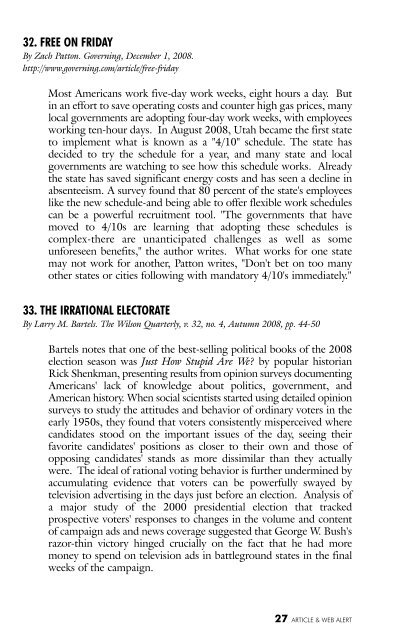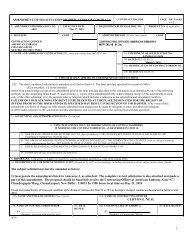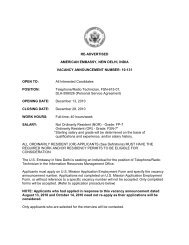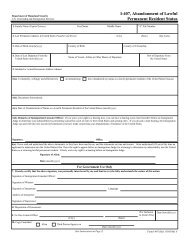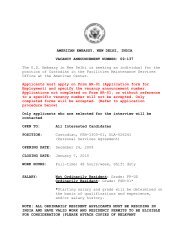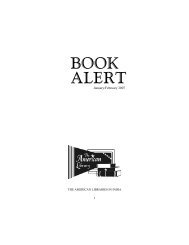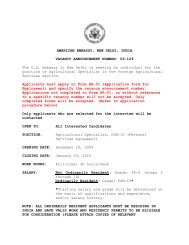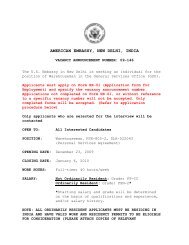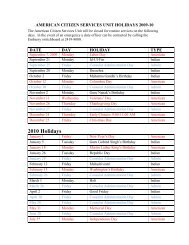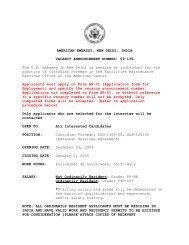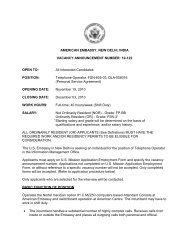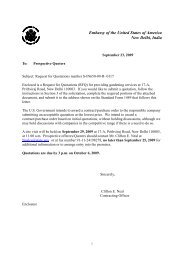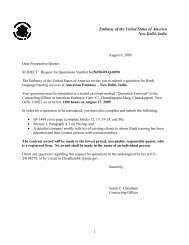Article & Web Alert (May/June 2009) - New Delhi
Article & Web Alert (May/June 2009) - New Delhi
Article & Web Alert (May/June 2009) - New Delhi
You also want an ePaper? Increase the reach of your titles
YUMPU automatically turns print PDFs into web optimized ePapers that Google loves.
32. FREE ON FRIDAYBy Zach Patton. Governing, December 1, 2008.http://www.governing.com/article/free-fridayMost Americans work five-day work weeks, eight hours a day. Butin an effort to save operating costs and counter high gas prices, manylocal governments are adopting four-day work weeks, with employeesworking ten-hour days. In August 2008, Utah became the first stateto implement what is known as a "4/10" schedule. The state hasdecided to try the schedule for a year, and many state and localgovernments are watching to see how this schedule works. Alreadythe state has saved significant energy costs and has seen a decline inabsenteeism. A survey found that 80 percent of the state's employeeslike the new schedule-and being able to offer flexible work schedulescan be a powerful recruitment tool. "The governments that havemoved to 4/10s are learning that adopting these schedules iscomplex-there are unanticipated challenges as well as someunforeseen benefits," the author writes. What works for one statemay not work for another, Patton writes, "Don't bet on too manyother states or cities following with mandatory 4/10's immediately."33. THE IRRATIONAL ELECTORATEBy Larry M. Bartels. The Wilson Quarterly, v. 32, no. 4, Autumn 2008, pp. 44-50Bartels notes that one of the best-selling political books of the 2008election season was Just How Stupid Are We? by popular historianRick Shenkman, presenting results from opinion surveys documentingAmericans' lack of knowledge about politics, government, andAmerican history. When social scientists started using detailed opinionsurveys to study the attitudes and behavior of ordinary voters in theearly 1950s, they found that voters consistently misperceived wherecandidates stood on the important issues of the day, seeing theirfavorite candidates' positions as closer to their own and those ofopposing candidates' stands as more dissimilar than they actuallywere. The ideal of rational voting behavior is further undermined byaccumulating evidence that voters can be powerfully swayed bytelevision advertising in the days just before an election. Analysis ofa major study of the 2000 presidential election that trackedprospective voters' responses to changes in the volume and contentof campaign ads and news coverage suggested that George W. Bush'srazor-thin victory hinged crucially on the fact that he had moremoney to spend on television ads in battleground states in the finalweeks of the campaign.27 ARTICLE & WEB ALERT


